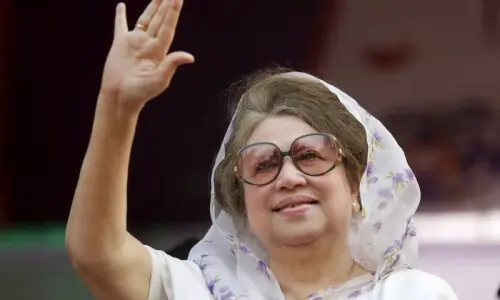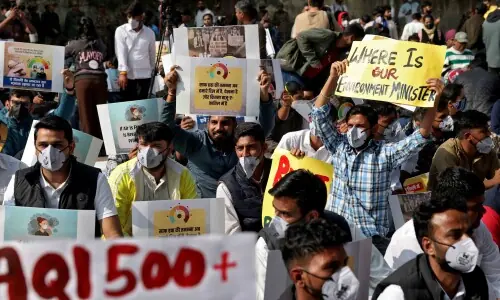DHAKA: A special Bangladeshi court on Wednesday handed the death sentence to the leader of the country's largest religious party for war crimes, in a long-awaited verdict that triggers fears of fresh violence.
The war crimes court found Motiur Rahman Nizami, head of the Jamaat-i-Islami party, guilty of mass murder, rape and looting during Bangladesh's war of independence against Pakistan in 1971.
Head judge Enayetur Rahim sentenced Nizami to “hang by the neck until his death” for orchestrating the killing of top doctors and intellectuals during the conflict as head of a ruthless militia.
“It's a historic verdict,” chief prosecutor Haider Ali told reporters outside the packed and heavily guarded court in Dhaka.
Ali said Nizami, who became Jamaat's leader in 2000 and was once a minister in a Jamaat-allied government, led the notorious Al-Badr militia “which took part in many heinous crimes”.
Security was tightened across Bangladesh ahead of the verdict after similar judgements against several of Nizami's senior lieutenants plunged the country into one of its worst crises last year.
Tens of thousands of Jamaat supporters fought with police and more than 500 people died in the unrest and subsequent political violence ahead of disputed polls in January.
Jamaat called a called three-day nationwide strike starting on Thursday in protest at Nizami's verdict.
Junior home minister Asaduzzaman Khan said before the verdict that “all sorts of security measures” had been taken across Bangladesh amid fears of a new bout of bloodletting.
“We won't tolerate any attempt to create instability or chaos,” Khan told reporters on Tuesday.
While it was effectively banned from taking part in the legislative elections, Jamaat's activists staged shows of strength on the streets of Dhaka and other cities in the aftermath of the previous verdicts.
Death hit list
Extra police and border guards were deployed on Wednesday in the capital and other major cities, security officials said.
The verdict, originally scheduled for June, was postponed at the 11th hour because Nizami was suffering from high blood pressure.
As leader of now defunct Islami Chhatra Sangha (ICS), prosecutors say, Nizami turned the then student wing of Jamaat into a pro-Pakistani militia which killed professors, writers, doctors and journalists.
The aim was to make the fledgling nation an “intellectual cripple”, prosecutor Mohammad Ali said before the verdict.
“When it was clear Pakistan was losing the war, as the chief commander of Al Badr he ordered a 'hit list' based on which top intellectuals were abducted and killed,” he said.
Nizami is already on death row after being sentenced to hang in January for trafficking weapons and trying to ship them to a rebel group in northeast India.
His defence lawyer said he would appeal the sentence, saying Nizami was being pursued as part of a government witch-hunt against its opponents.
“It's an unacceptable judgement. The court ruled beyond its jurisdiction.
There was no evidence that anyone saw him killing,” lawyer Tajul Islam said.
Since it was established by Prime Minister Sheikh Hasina's government in 2010, the self-styled International Crimes Tribunal has sentenced around a dozen opposition leaders for war crimes.
Rights groups have criticised the trials, saying they fall short of international standards and lack any international oversight.
The country's secular government maintains the trials are needed to heal the wounds of the conflict.
Independent researchers estimate that between 300,000 and 500,000 people died in the 1971 war.

































